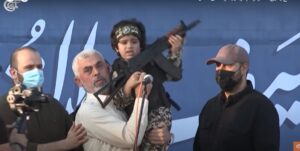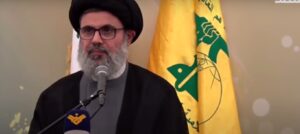Hamas officials say that the rocket attacks on Israel from the Gaza Strip, South Lebanon and Syria following the violent events at the Al-Aqsa Mosque are the beginning of the implementation of the Iranian strategy of uniting the fronts against Israel devised by General Qasem Soleimani, commander of the Quds Force in the Revolutionary Guards who was assassinated by the US Army in Iraq in January 2020.
The Iranian plan is to tighten the strangling ring around Israel and attack it simultaneously with rockets, precision missiles and drones from several fronts gradually until its destruction, Iran is in no hurry and it is a long-term plan that is also designed to thwart an Israeli attack on its nuclear facilities.
Iran and its proxies in the Middle East have made a strategic decision in recent weeks to change the rules of the game against Israel that have been used up until now because of their assessment that Israel has weakened due to the wave of internal protests against the judicial reform and the crisis in Israel’s relations with the US and that this is the time to hit Israel hard from several fronts at the same time because the IDF can not face a war on several fronts at the same time.
The implementation of the plan was accelerated by Iran because of the successful attacks of the Israeli Air Force on Iranian and Hezbollah targets inside Syria.
The leaders of Hezbollah, Hamas and the Islamic Jihad coordinated in recent weeks the new plan to attack Israel with the Revolutionary Guards in Iran.
The Houthi rebels in Yemen, who are loyal to Iran, are also threatening to join the attack on Israel and attack it with precision missiles and drones.
At the same time, the effort of Iran and the Hamas movement to encourage attacks in the West Bank against Israel and to escalate the security situation on the Temple Mount continues until the end of the month of Ramadan.
Iranian officials claim that Israel is escalating the security situation in coordination with the US in order to sabotage the reconciliation agreement signed between Iran and Saudi Arabia.
The head of the CIA, William Burns, visited Saudi Arabia last week and warned the Saudi royal family from further rapprochement with Iran and expressed the White House’s displeasure with this move by Saudi Arabia.
Iranians sources claim that several officers of the Revolutionary Guards who opposed the signing of the agreement between Iran and Saudi Arabia were arrested in Tehran and that General Ismail Qa’ani, commander of the Quds Force, personally gave instructions to prevent any attempt to sabotage the new agreement between Iran and Saudi Arabia.
The attacks by Iran, Hezbollah and Hamas on Israel are taking place while the situation in Lebanon is on the verge of collapse due to the difficult economic situation, the political entanglement and the inability of the forces in power in Lebanon to reach an agreement on the election of a new president for the country while Hezbollah is trying to force its candidate into office, former minister Suleiman Faranjiya.
Several parties in Lebanon accuse Hezbollah of allowing Hamas to launch rockets at Israel from southern Lebanon, endangering Lebanon and potentially dragging it into a destructive war again as it did in 2006.
Senior political officials in Jerusalem say that the Israeli military response to the rocket attacks from the Gaza Strip, southern Lebanon and Syria is careful and measured in a way that will not lead to an all-out war on several fronts, Israel does not want to enter into such a war at this time.
The strategy of uniting the fronts implemented by the resistance axis led by Iran is very dangerous for Israel and it needs to find the right way and the right timing to deal with it, in the last round of fighting Israel lost the initiative and the ability to surprise and had to respond to the attack on it in a way that would not lead to further escalation.
The main consideration of the political echelon was to quietly pass the period of time remaining until after Passover, the month of Ramadan and Independence Day without unnecessary escalation and not to be dragged along by the provocations of Hamas and Hezbollah.
A senior security official says that the axis of resistance led by Iran is completely wrong in its assessment of the situation regarding Israel’s national strength, the state of Lebanon is the one in danger of disintegration and not Israel, despite Hezbollah’s large arsenal of weapons, a strong military strike by Israel on Hezbollah and Lebanon’s civilian infrastructure will lead to its collapse .
Israel is now preparing for a military attack on Iran’s nuclear facilities and will not allow it to obtain nuclear weapons, Israel has the power to achieve this goal.
The last word has not yet been said and Israel is now reorganizing to thwart Iran’s phased plan, Minister Israel Katz, a member of the Defense Cabinet, has warned that Israel will renew the targeted assassination of Hamas leaders in the Gaza Strip and abroad if the Hamas organization continues its terrorist attacks and rocket fire at Israel.



